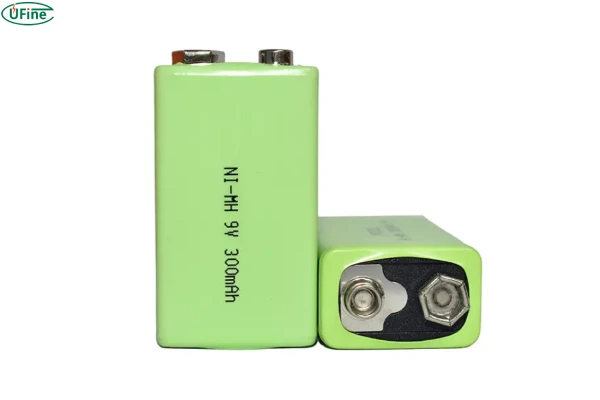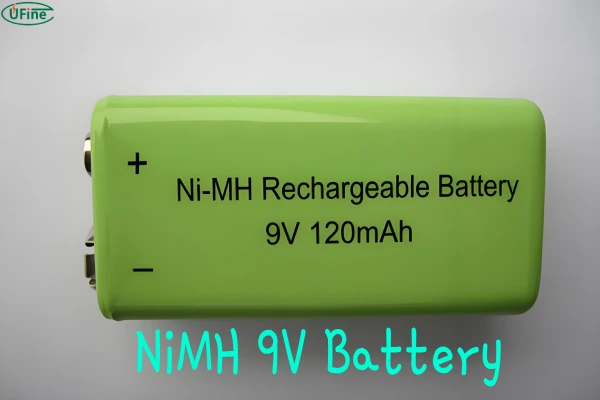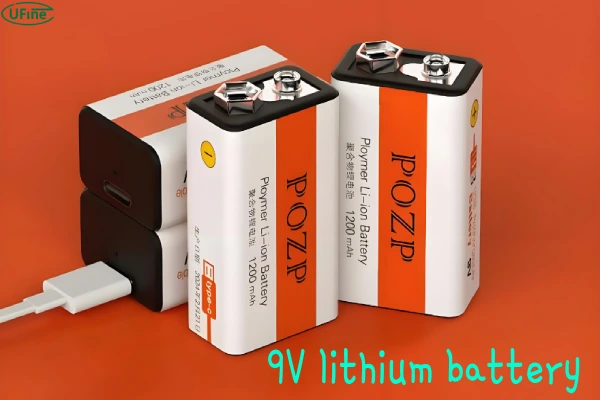
- Part 1. What is the 9V battery?
- Part 2. 9V battery types
- Part 3. Key parameters to consider
- Part 4. How long will a 9V battery last?
- Part 5. Where 9V batteries are used?
- Part 6. Are all 9V batteries the same size?
- Part 7. Is a 9V lithium battery the best?
- Part 8. Is a 9V battery bechargeable?
- Part 9. Choosing a 9V battery connector
- Part 10. Choosing the right 9V battery charger
Imagine your smoke alarm beeping in the middle of the night, or your guitar pedal suddenly cutting out during a live performance. These moments of frustration highlight the importance of having a reliable power source like the 9V battery. Small yet powerful, 9V batteries fuel a wide range of devices, from safety equipment to entertainment gadgets. In this guide, we’ll dive deep into everything you need to know about 9V batteries—from understanding their various types to learning how to choose the best one for your devices.
Part 1. What is the 9V battery?
A 9V battery is a rectangular-shaped power source typically used in small electronic devices that require higher voltage. Despite its compact size, a 9V battery delivers 9 volts of energy, thanks to six smaller cells housed within. These cells are arranged in a series to provide the total voltage, making this battery capable of powering devices that demand stable and reliable energy.
Measuring approximately 48 mm in height, 26 mm in width, and 17.5 mm in thickness, the 9V battery is small enough to fit in the palm of your hand yet powerful enough to keep devices like smoke alarms and portable radios running. Its unique two-terminal design, with one snap-style positive terminal and one negative terminal, makes it easy to connect to a variety of devices.
In addition to its physical characteristics, the 9V battery is known for its versatility and reliability in low-drain and high-drain applications alike. Whether you’re using it in a critical safety device or a household gadget, understanding the features of a 9V battery helps you make more informed choices about your power needs.
Part 2. 9V battery types
Not all 9V batteries are created equal. The type of 9V battery you choose will depend on the application and your specific needs. Here’s a breakdown of the different 9V battery types based on their chemistry:
-
Alkaline 9V Batteries: These are the most common and widely available. Alkaline batteries are reliable, affordable, and offer decent performance for most low- to medium-drain devices. They are disposable and not rechargeable, making them suitable for short-term use in devices like smoke detectors or toys.
-
Lithium 9V Batteries: Lithium batteries are known for their long lifespan and consistent voltage output. They perform well in high-drain devices and are particularly valuable in critical applications, such as smoke detectors, where you don’t want to replace batteries often. They also work efficiently in extreme temperatures, making them ideal for outdoor equipment.
-
Nickel-Metal Hydride (NiMH) 9V Batteries: These are rechargeable batteries that can be used hundreds of times. NiMH 9V batteries are cost-effective in the long run and eco-friendly, but they tend to have a slightly lower capacity compared to alkaline or lithium batteries. They are ideal for devices that require frequent battery changes, such as wireless microphones or portable audio equipment.
-
Carbon-Zinc 9V Batteries: These are the cheapest type of 9V batteries but offer the lowest performance. They are best suited for low-drain devices like clocks or remote controls. Due to their shorter lifespan, carbon-zinc batteries are not recommended for critical devices that require long-lasting power.
By understanding these types, you can choose the right battery for each of your devices, balancing performance, cost, and environmental impact.
Lithium Battery VS Alkaline Battery: How to Choose?
Part 3. Key parameters to consider
When selecting a 9V battery, there are several key parameters you should keep in mind to ensure you’re getting the best option for your device:
-
Capacity: Measured in milliampere-hours (mAh), capacity indicates how much energy the battery can store. The higher the capacity, the longer the battery will last. For example, a lithium 9V battery may have a capacity of 1200mAh, while an alkaline one may range between 500 and 600mAh.
-
Shelf Life: This refers to how long a battery can retain its charge when not in use. Alkaline batteries typically have a shelf life of 5-7 years, whereas lithium batteries can last up to 10 years in storage. If you’re purchasing batteries for emergency devices like smoke alarms, shelf life is a critical factor.
-
Discharge Rate: A low self-discharge rate means the battery will retain its charge longer when not in use. Lithium batteries tend to have a lower self-discharge rate compared to alkaline and NiMH options, making them ideal for devices that may sit idle for long periods.
-
Rechargeability: Rechargeable 9V batteries, such as NiMH, can be used multiple times, offering long-term savings and environmental benefits. While these batteries have a lower capacity per charge compared to their disposable counterparts, they can be recharged hundreds of times, making them more cost-effective for frequent use.
-
Temperature Tolerance: If your device operates in extreme temperatures, a lithium 9V battery is the best choice. Lithium batteries perform well in both high and low temperatures, while alkaline batteries may degrade faster in such conditions.
Considering these parameters helps ensure that the 9V battery you choose will provide optimal performance for your specific application.
Part 4. How long will a 9V battery last?
The lifespan of a 9V battery varies significantly depending on its type and the device it powers. Here’s a general guide to how long different 9V batteries last:
-
Alkaline 9V batteries can last between 6 months to 1 year in low-drain devices like smoke alarms or clocks. In high-drain devices, such as wireless microphones, they may only last for a few hours of continuous use.
-
Lithium 9V batteries have the longest lifespan, lasting up to 10 years in low-drain devices. Even in high-drain applications, they provide a longer runtime compared to alkaline batteries.
-
Rechargeable NiMH 9V batteries last for 6-12 months per charge, but they can be recharged up to 500-1,000 times. This makes them ideal for devices that require frequent battery changes, such as walkie-talkies or medical equipment.
Understanding battery lifespan helps you choose the most cost-effective and reliable option for your specific device.
Part 5. Where 9V batteries are used?
9V batteries are incredibly versatile and can be found in a wide variety of devices. Here are some common application scenarios:
-
Smoke Alarms: Perhaps the most important application of 9V batteries is in smoke detectors. A reliable 9V battery can be the difference between life and death in emergency situations.
-
Portable Audio Devices: Wireless microphones, guitar pedals, and other audio equipment often use 9V batteries to ensure uninterrupted performance during concerts or events.
-
Medical Equipment: Devices like glucose meters and portable defibrillators rely on 9V batteries for accurate and dependable operation.
-
Remote-Controlled Toys: Some RC cars and planes use 9V batteries for optimal power and control.
-
Multimeters: Electricians and hobbyists use 9V batteries in their multimeters for testing electrical circuits.
-
Emergency Radios and Flashlights: In times of natural disasters or power outages, emergency devices powered by 9V batteries provide critical communication and light.
Part 6. Are all 9V batteries the same size?
Yes, 9V batteries are standardized in size, meaning they will fit most devices designed to use 9V batteries. The standard dimensions are 48 mm in height, 26 mm in width, and 17.5 mm in thickness. However, certain high-capacity or rechargeable 9V batteries may be slightly heavier or have different casing materials, but the size remains consistent across all types.
Part 7. Is a 9V lithium battery the best?
For many applications, a lithium 9V battery is considered the best option due to its long shelf life, consistent voltage output, and superior temperature performance. Lithium batteries can last up to 10 years in devices like smoke detectors and provide more reliable power in extreme conditions. However, for everyday use in low-drain devices, alkaline batteries may offer better value for money.
Part 8. Is a 9V battery bechargeable?
Yes, some 9V batteries, particularly NiMH (Nickel-Metal Hydride) batteries, are rechargeable. Rechargeable 9V batteries are an excellent choice for frequent use in high-drain devices, as they can be recharged hundreds of times, reducing both cost and environmental impact. NiMH batteries offer reliable performance and are available in most stores that sell standard disposable batteries.
Part 9. Choosing a 9V battery connector
When choosing a 9V battery connector, it’s important to ensure that it is compatible with both your battery and your device. There are several types of connectors, including snap connectors and clip-on styles. Durability is another crucial factor—look for connectors made of high-quality materials that can withstand regular use and wear.
Part 10. Choosing the right 9V battery charger
If you’re using rechargeable 9V batteries, choosing the right charger is crucial. Look for a charger that is compatible with the specific chemistry of your battery (e.g., NiMH). Additionally, a good charger should offer overcharge protection to prevent damage to your battery, and ideally, it should be able to charge multiple batteries at once.
Related Tags:
More Articles

Battery Load Test: A Comprehensive Guide
Step-by-step battery load test guide for car, solar & industrial use. Learn how to load test a battery, interpret voltage charts, and avoid common mistakes.
The Comprehensive Guide to Battery Balancing and Battery Balancer
Discover how battery balancers improve lithium battery performance, lifespan, and safety. Learn types, functions, and tips to choose the right balancer.
What Is the Best Voltage for a Chainsaw Battery?
Compare 12V-80V chainsaw batteries for light pruning, medium firewood, and professional cutting. See best battery chainsaw with runtime charts and safety tips.
Lithium VS. Alkaline Batteries: A Comprehensive Comparison
Lithium batteries last 3–7× longer than alkaline and perform better in cold weather. Compare lifespan, cost, safety, and best uses to choose the right battery.
Comparing Lithium-Sulfur and Lithium-Ion Batteries: Which is Right for You?
Compare lithium-sulfur (Li-S) and lithium-ion batteries on energy, lifespan, cost, safety, and applications. Best choice for drones, EVs, and electronics.





